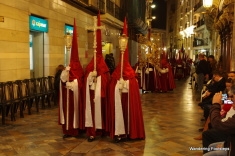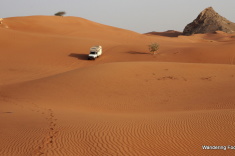I have been to twenty African countries; I’ve slept on deserted islands in the South Pacific; and I have trekked in jungles in Asia and South America.
Never have I ever experienced a wilderness so wild as in Canada.
I first started to notice this back in Manitoba. We were in the isolated and rarely-visited western sector of Riding Mountain National Park. During the day, parked on a red Adirondack chair by the lake, the place seemed tame enough. Peaceful, actually.
.jpg)
The #sharethechair movement, in Riding Mountain National Park.
.jpg)
Totally alone and totally isolated in this wilderness campground.
A lady popped by the campground. She was scoping out the back-country trails for her yearly hike. The past few springs had been exceedingly rainy, making the trails muddy, the bugs horrific. This year looked more promising, and she was looking forward to her week of solitude in the park’s untamed wilderness.
The following day, we moved our camp eastward, to Lake Audy. To reach this central sector of the park we had to drive out the way we’d come, make a huge detour, come back up into the park from another route, and then veer west again on the bumpiest gravel road our bus had yet encountered. That’s how dense the park’s forests were – only those back-country trails the woman spoke of ran through them.
Bruno and I set out for a bike ride on those trails. Normally we would hike, but the mosquitoes had picked up and we hoped to outpace them with wheels. We managed to, but eventually got stuck in mud so thick we were forced to turn around. If this had been a dry spring, I couldn’t imagine a wet one.
.jpg)
Prepping the bikes for our ride.

Before we hit the muddy part of the trail and had to turn around.
As I contemplated the nature of this national park, I began to compare it to those Bruno and I had visited in the United States – Petrified Forest and Saguaro, Grand Canyon and Grand Teton, and most recently, Yellowstone. Each of those parks preserve a unique natural feature (usually geological), and visiting the park was much like visiting a European city – go snap-happy with the camera as we ogle at the beauty before us while simultaneously learning about the history of our surroundings.
In Canada, however, it seemed the national parks serve a different purpose – that of the preservation of nature, full stop. The swathes of nature preserved by Canada Parks aren’t particularly unique or geologically interesting to humans, but instead represent important habitat for flora and fauna. Humans are permitted to enjoy the parks, sure, but that enjoyment is incidental. Interestingly, I saw a lot fewer tour buses and day trippers in Canada’s National Parks, and more hard-core outdoor enthusiasts here for the hiking, biking, canoeing, and kayaking.

Here just to enjoy.

Mantra of Canada Parks: preservation of nature.
The national park that probably most represents this vision of environmental preservation is Pukaskwa National Park, along Ontario’s segment of Lake Superior. The park is gigantic, but accessible by a single route that reaches into the most northern 1% of the park. The rest of the park is pure wilderness, available only to hikers and kayakers. Visitor numbers to this section of the park are restricted so as to minimize human impact on these untamed wilds.
Bruno and I opted not to visit Pukawskwa. We’d been in northern Ontario for several days by this point, traveling deeper and deeper into its wilderness of forests and lakes. When we hit Lake Superior – the third largest lake in the world and the only Great Lake I had not yet seen – the weather went bad. The sky was covered in a perpetual fog, grey clouds announced nothing but seemingly-endless rain, and in the little moments where things cleared up, the wind from the bitingly cold lake kept us in our winter clothing.
In the little lakeside town of Terrace Bay, we stopped in a café for a hot beverage. The owner seemed eager to chat, so I asked him if this weather was normal at this time of year. I was convinced it wasn’t, and trying to prove so to Bruno, who had been teasing me for days that this was summer in Canada.
“Oh yeah, this is normal weather around here,” the owner replied, much to my dismay. “We only just got rid of the last of our snow last month, and the leaves on the trees came in around the end of May. The locals start sweating when – during a few days in late-July – our temperatures reach 20 degrees celcius.”
I couldn’t imagine living through an eight-month winter, only to be rewarded with a few days of twenty-degree weather. And what was the point of visiting a practically-inaccessibly national park only to sit inside the bus hiding from the rain and cold?

Lake Superior on a typical cold, grey day.

A fairly clear view o Lake Superior, which was moe often than not entirely covered in fog.
A day or two after that, though, is the real reason we didn’t visit Pukaskwa. We had found a wonderful spot to camp for the night at the edge of a little lake near White River. We’d just met Brian, an old fellow in a flannel shirt and a pickup truck who’d popped by for a chat. He’d jumped from one conversation to the other – about how he had killed a hundred moose but he no longer would because they’re so rare; that trees had spirits and every time he cut one down for one of his log cabins dotting the area, it hurt him; that he was absolutely dismayed by the clear-cutting of the surrounding forests and the wind turbines they’d recently installed on what he felt was sacred land; that we should collect some rocks down by the lake because they were from the last ice age and held special energetic powers. It was clear to me that this man loved his land, loved his wild, cold home.

There’s a lot of beauty to love in this region, I suppose.

Unfortunately we saw a lot of these trucks.
Bruno and I set in for the night. Until that point, the bugs hadn’t been as bad as I’d expected. When I knew we would be in northern Ontario in late June, I had posted a question on Facebook asking my Ontarian friends how bad the bugs would be at that time of year. The replies I received had been frightening – “don’t wear a white shirt; it’ll be soaked red,” “I remember scraping caked blood off from behind my ears,” and “don’t go, just don’t”. I’d only just received my first two black fly bites (ever!) the day before. They’d turned into bloody welts, surprisingly large from such a small insect, but still, there had only been two.
Things changed that night. As I was reading in bed, I started to notice mosquitos flying around our room. I am one of those people who will stay awake all night because of a single mosquito buzzing in my ears. Naturally, then, I proceeded to chase and kill them (yes, I know, it doesn’t seem like me, but I swear these are the only living creatures I kill!). Yet, for each mosquito I killed, two more materialized. What should have been a simple one-two turned into a rampage of over fifty mosquitoes, and I went to bed anxious and paranoid.
I was right to be paranoid. Bruno and I were awoken at dawn to an incredible sunrise. But that’s not why we’d woken up – it was the swarm of mosquitoes buzzing around our heads. The next couple hours were a half-asleep blur of swatting, buzzing, and cursing. Breakfast was much the same. I didn’t even consider stepping outside, for, glued outside our windows was a thick blanket of mosquitoes desperately trying to find their way in.

The beautiful, mosquito-infested sunrise.
All told, I killed over 120 mosquitoes before Bruno tried stuffing the tiny holes at the bottom of each window that evacuate rain water from the window frame.
So, yeah, I wasn’t interested in another night with the mosquitoes. Pukaskwa – the epitome of Canadian wilderness – could keep its untamed backcountry. I’d had enough of wilderness for now.
I was grateful when the Sault Ste-Marie locks led Lake Superior into Lake Huron. Here, the forests seemed less dense, the weather milder, the water calmer and clearer. We entered Mennonite territory, and I was way more interested in their farmland and their traditional ways that I thought I would be. They seemed so, well, civilized.

Mennonites shun motorized transportation and opt for horse-drawn carriage.

There were these signs all over the Lake Huron area east of Sault Ste-Marie.

Mennonites even use horse-drawn farm equipment!
It was a few weeks before I was brave enough to venture back into Canada’s wilderness – this time in Quebec’s La Mauricie National Park. Admittedly, it was lovely. We witnessed more of Canada’s endless lakes and forests, but the weather was finally warm and sunny. We hiked to a waterfall and sat on a boulder at its edge, enjoying the cool flow of its water. We mountain biked to another, less popular, waterfall, and picnicked atop its forested rim (apart from lakes and forests, Canada has a lot of waterfalls). We experienced the vastness of the park’s wilderness from its stunning bird’s eye viewpoints, and relaxed in the sun at our campground.
But throughout all these wonderful moments, we battled – you guessed it – the mosquitoes. In fact, they were worse here than I have ever experienced in my life (yes, fellow New Brunswickers, our mosquitoes have nothing on these). They were around morning, noon, and night. In the sun. By flowing water. And they were the biggest, fattest suckers I’d ever seen. Everything we did, we did while swatting ourselves.

Enjoying the cool water.

Bird’eye view. This is actually a lake!

A view of beautiful Canada from above the tree line.

A picnic lunch by a waterfall.
I think it’s a few things that make Canada’s wilderness so challenging. First of all, it’s the weather. Wind, cold, rain, snow, scorching sun – even in summer, every day brings a new meteorological surprise.
Second, it’s the vastness of its land. The space, though beautiful, is intimidating. In Canada, you can really be utterly and truly out there on your own.
Thirdly – and perhaps most crucially – it’s the insects. I mentioned the mosquitoes and the black flies (who, by the way, did get worse soon after my first two bites). I didn’t mention all the spiders we keep finding in our bus. They come in all shapes and sizes, and we remove at least one a day from our home-on-wheels.
I also didn’t mention the tick. Yeah, I got bit by one. It was way back in Riding Mountain National Park. There were signs everywhere to be extra careful of them because these black-legged critters carry diseases. We saw a few – one on my yoga mat, one in the house, one on Bruno’s shoe. We were extra careful during our hikes and bike rides, and always checked ourselves thoroughly afterwards.
The one that got me was at a totally unexpected moment – on a bench in a manicured lakeside park in Wasagaming, the highly-developed cottage country of Riding Mountain. We caught it right as it bit into my neck, and Bruno removed it promptly. It was disgusting, of course, and my first tick bite ever, but we didn’t worry about it because it had barely bitten me.
It wasn’t until five weeks later that I developed strange bulls-eye-shaped welts on my shoulder and neck. Five hours waiting in the emergency room and a six-vial blood test later, and I’m on antibiotics for Lyme disease*.

My strange bulls-eye bite. Tick bite? Perhaps!
See what I mean about Canada’s wilderness?
*In case you’re freaking out, we’re not totally sure yet that I have Lyme disease. The results won’t be in for another couple weeks, but I’m on the meds just in case.



Louise Jones-Takata - W O W! This one’s not for me! I do love your photos and the telling of your experiences in the Canadian wilderness. Needless to say, I do hope that it wasn’t’t Lyme, Babesiosis or Erlichio. You were absolutely correct in seeking help and ANTIBIOTICS.
Hugs, Louise
P.S. I had not rad your latest blog and I learned about your tick bite from Freya as we just spent the weekend at my place doing city stuff.
Brittany - I’m sure we will both be waiting for news from Freya’s June cruise to the Great Lakes to see what her impressions on the Canadian wilderness were!
Freya Gnerre - Hi Brittany and Bruno, Keep those blogs and great pictures coming! After reading this one, I’m starting to wonder about the cruise I have booked for next June around all the great lakes – leaving from Toronto and ending in Chicago. We are making stops at many wilderness places, but, now I don’t know if I’ll be getting off the ship. Since it is a small cruise ship, they can go into places other ships can’t and then they use small boats to take people ashore. I hate bug bites! I hope you continue to feel better and not have lyme disease pr worse. Hope our paths meet soon.
Love, Freya
Brittany - Hi Freya!
Your cruise sounds very nice and I definitely don’t want to worry you with my post! It’ll definitely be chilly and buggy up around Lake Superior but *hopefully* it won’t be too bad at the other lakes. I do have a feeling bugs will be a reality, so best to cover yourself with clothes and bug spray! At least none of the bugs can kill you, right? 🙂
You’ll have to let me know how things went, in any case. We can compare notes!
B & B